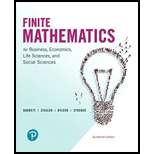
Concept explainers
Health plans. A midwestern university offers its employees three choices for health care: a clinic-based health maintenance organization (HMO), a preferred provider organization (PPO). and a traditional fee-for-service program (FFS). Each year, the university designates an open enrollment period during which employees may change from one health plan to another. Prior to the last open enrollment period,
(A) Write the transition matrix.
(B) What percentage of employees were enrolled in each health plan after the last open enrollment period?
(C) If this trend continues, what percentage of employees will be enrolled in each plan after the next open enrollment period?
Want to see the full answer?
Check out a sample textbook solution
Chapter 9 Solutions
Finite Mathematics for Business, Economics, Life Sciences and Social Sciences
Additional Math Textbook Solutions
Elementary Statistics: Picturing the World (7th Edition)
Elementary Statistics
University Calculus: Early Transcendentals (4th Edition)
A Problem Solving Approach To Mathematics For Elementary School Teachers (13th Edition)
Calculus: Early Transcendentals (2nd Edition)
Basic Business Statistics, Student Value Edition
- Let A be a vector space with basis 1, a, b. Which (if any) of the following rules turn A into an algebra? (You may assume that 1 is a unit.) (i) a² = a, b² = ab = ba = 0. (ii) a²=b, b² = ab = ba = 0. (iii) a²=b, b² = b, ab = ba = 0.arrow_forwardNo chatgpt pls will upvotearrow_forward= 1. Show (a) Let G = Z/nZ be a cyclic group, so G = {1, 9, 92,...,g" } with g": that the group algebra KG has a presentation KG = K(X)/(X” — 1). (b) Let A = K[X] be the algebra of polynomials in X. Let V be the A-module with vector space K2 and where the action of X is given by the matrix Compute End(V) in the cases (i) x = p, (ii) xμl. (67) · (c) If M and N are submodules of a module L, prove that there is an isomorphism M/MON (M+N)/N. (The Second Isomorphism Theorem for modules.) You may assume that MON is a submodule of M, M + N is a submodule of L and the First Isomorphism Theorem for modules.arrow_forward
- (a) Define the notion of an ideal I in an algebra A. Define the product on the quotient algebra A/I, and show that it is well-defined. (b) If I is an ideal in A and S is a subalgebra of A, show that S + I is a subalgebra of A and that SnI is an ideal in S. (c) Let A be the subset of M3 (K) given by matrices of the form a b 0 a 0 00 d Show that A is a subalgebra of M3(K). Ꮖ Compute the ideal I of A generated by the element and show that A/I K as algebras, where 0 1 0 x = 0 0 0 001arrow_forward(a) Let HI be the algebra of quaternions. Write out the multiplication table for 1, i, j, k. Define the notion of a pure quaternion, and the absolute value of a quaternion. Show that if p is a pure quaternion, then p² = -|p|². (b) Define the notion of an (associative) algebra. (c) Let A be a vector space with basis 1, a, b. Which (if any) of the following rules turn A into an algebra? (You may assume that 1 is a unit.) (i) a² = a, b²=ab = ba 0. (ii) a² (iii) a² = b, b² = abba = 0. = b, b² = b, ab = ba = 0. (d) Let u1, 2 and 3 be in the Temperley-Lieb algebra TL4(8). ገ 12 13 Compute (u3+ Augu2)² where A EK and hence find a non-zero x € TL4 (8) such that ² = 0.arrow_forwardQ1: Solve the system x + x = t², x(0) = (9)arrow_forward
- Co Given show that Solution Take home Су-15 1994 +19 09/2 4 =a log суто - 1092 ж = a-1 2+1+8 AI | SHOT ON S4 INFINIX CAMERAarrow_forwardBetween the function 3 (4)=x-x-1 Solve inside the interval [1,2]. then find the approximate Solution the root within using the bisection of the error = 10² method.arrow_forwardCould you explain how the inequalities u in (0,1), we have 0 ≤ X ≤u-Y for any 0 ≤Y<u and u in (1,2), we either have 0 ≤ X ≤u-Y for any u - 1 < Y<1, or 0≤x≤1 for any 0 ≤Y≤u - 1 are obtained please. They're in the solutions but don't understand how they were derived.arrow_forward
- E10) Perform four iterations of the Jacobi method for solving the following system of equations. 2 -1 -0 -0 XI 2 0 0 -1 2 X3 0 0 2 X4 With x(0) (0.5, 0.5, 0.5, 0.5). Here x = (1, 1, 1, 1)". How good x (5) as an approximation to x?arrow_forwardby (2) Gauss saidel - - method find (2) و X2 for the sestem X1 + 2x2=-4 2x1 + 2x2 = 1 Such thef (0) x2=-2arrow_forwardCan you please explain how to find the bounds of the integrals for X and Y and also explain how to find the inequalites that satisfy X and Y. I've looked at the solutions but its not clear to me on how the inequalities and bounds of the integral were obtained. If possible could you explain how to find the bounds of the integrals by sketching a graph with the region of integration. Thanksarrow_forward
 Discrete Mathematics and Its Applications ( 8th I...MathISBN:9781259676512Author:Kenneth H RosenPublisher:McGraw-Hill Education
Discrete Mathematics and Its Applications ( 8th I...MathISBN:9781259676512Author:Kenneth H RosenPublisher:McGraw-Hill Education Mathematics for Elementary Teachers with Activiti...MathISBN:9780134392790Author:Beckmann, SybillaPublisher:PEARSON
Mathematics for Elementary Teachers with Activiti...MathISBN:9780134392790Author:Beckmann, SybillaPublisher:PEARSON
 Thinking Mathematically (7th Edition)MathISBN:9780134683713Author:Robert F. BlitzerPublisher:PEARSON
Thinking Mathematically (7th Edition)MathISBN:9780134683713Author:Robert F. BlitzerPublisher:PEARSON Discrete Mathematics With ApplicationsMathISBN:9781337694193Author:EPP, Susanna S.Publisher:Cengage Learning,
Discrete Mathematics With ApplicationsMathISBN:9781337694193Author:EPP, Susanna S.Publisher:Cengage Learning, Pathways To Math Literacy (looseleaf)MathISBN:9781259985607Author:David Sobecki Professor, Brian A. MercerPublisher:McGraw-Hill Education
Pathways To Math Literacy (looseleaf)MathISBN:9781259985607Author:David Sobecki Professor, Brian A. MercerPublisher:McGraw-Hill Education





